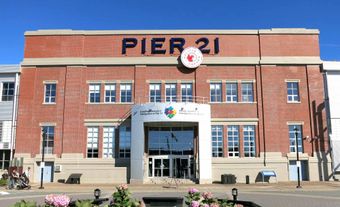Portuguese explorers were among the first Europeans to lay eyes on what is now Canadian soil. In the 2016 Canadian census, 482, 610 people reported being of Portuguese origin, and 221, 540 people reported having Portuguese as their mother tongue language.

Photo courtesy of Will S./Flickr.
History
In the mid to late 15th century, it is believed that Diogo de Teive (1452), João Vaz Corte-Real (1470), Joao Fernandes and Pedro de Barcelos (1493) touched on the eastern coast of Canada, and conclusive evidence exists about explorations by Miguel and Gaspar Corte-Real, who were lost in Newfoundland waters in 1501 and 1502 respectively. Numerous place names attest to the fact that Portuguese subsequently fished for cod on the Grand Banks. Labrador, likely from the Portuguese lavrador ("small landowner or farmer") indicates that the Portuguese knew of this territory. During five centuries of intermittent contact, however, only a handful of Portuguese fishermen settled on the Atlantic coast. The Portuguese in New France were descended from a few families founded by immigrants who arrived in 1668 and later.
Migration and Settlement
Over the years, Portuguese have immigrated to Canada for the same reasons as many other population groups, including economic opportunity, underemployment in their countries of origin and a desire to escape political oppression (see Immigration in Canada.)
From a trickle in the 1940s (around 200 people), Portuguese immigration to Canada increased rapidly after 1953. Immigrants arrived from the Azores (comprising 70 percent of Portuguese immigration to Canada) and Madeira archipelagoes and from continental Portugal. In the 1950s, many arrivals were recruited to work in rural and isolated locations in Canada, but soon established themselves in the larger cities. Between 1951 and 1957, 8115 people immigrated from Portugal; between 1958 and 1962, 16 731; between 1963 and 1967, 32 473; between 1968 and 1973, 54 199; and in 1984, 869.
In the 2016 census, 482, 610 Canadians reported being of Portuguese origin (264, 820 single response and 217, 790 multiple response). Most Portuguese Canadians reside in Ontario (324, 930), followed by Quebec (69, 805) and British Columbia (41, 765). Most Portuguese live in urban centres, although there are pockets of rural concentration.
In the 2016 census, 221, 540 people reported having Portuguese as their mother tongue (first language learned). Of this number, 97, 295 live in Toronto and 17,130 live in Montreal.
Social and Cultural Life
For the first generation of Portuguese, community cultural life was largely bound up with popular forms of entertainments, such as soccer matches, dances, picnics and music. Recreational activities were sponsored by clubs with Portuguese regional affiliations, or with parish congregations or Portuguese political parties. Today, Portuguese formal culture and language is taught in after-hours schools and in various schools and universities across Canada where numbers permit.
Many of the first generation prefer to attend social activities in Portuguese, but this was not always true for their Canadian-educated children. Economic advances followed urbanization. Most of the labourers first worked in Canada as farmhands or railway labourers. When they moved to the cities, they sought out janitorial, construction and factory work. Women were employed as cleaners or as textile or food-processing workers. During the 1960s, increasing numbers of families opened variety and clothing stores, fish shops, bakeries and restaurants. The minority with secondary education often became realtors, travel agents, or driving-school instructors, or provided other services for the community members. By the 1970s a second Canadian-trained generation included high-school teachers, lawyers, social workers, engineers and civil servants. Many more entered semiskilled and skilled trades.
Traditionally, most Portuguese were Roman Catholic (see Catholicism), but some converted to other Christian denominations; e.g., Pentecostal, Baptist, Jehovah's Witness and Seventh-day Adventist.
Group Maintenance
The first generation of Portuguese were concerned with maintaining their Portuguesismo, "Portugueseness" - but regional loyalties to the Portuguese area of origin have been equally compelling. At the local level emphasis on individual and family economic advances, heightened by class distinctions based on education and ways of life, have, at times, served as barriers to community-wide co-operation. Several Portuguese newspapers have been published in Toronto, Montreal, Winnipeg and Vancouver.

 Share on Facebook
Share on Facebook Share on X
Share on X Share by Email
Share by Email Share on Google Classroom
Share on Google Classroom

